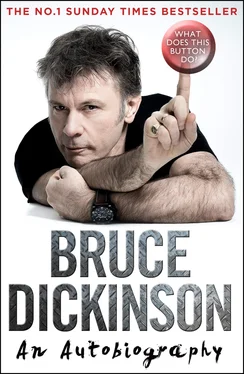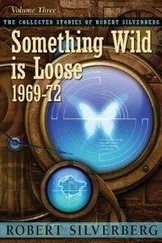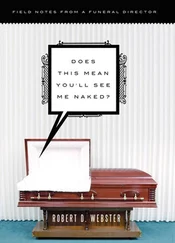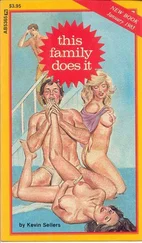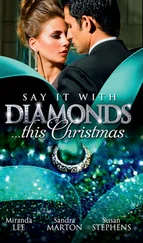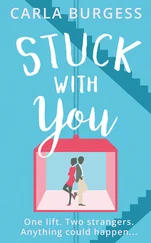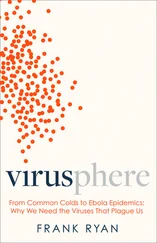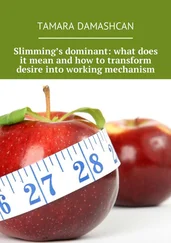The headline band was called Greensleeper, and they had that bored air of insouciance born of being the biggest thing in the postal district and doing gigs every weekend. They had a following, which turned up just before and left immediately after they played.
We were left to set up on the small stage in bright sunshine. There were some green fold-up chairs and some kids eating ice cream and squinting at us. We started to play. The drum kit was shifting around and the stage was not held together, so it started moving apart as well. At which point a ne’er-do-well gentleman jumped up on stage shouting, ‘Shut up – I’m trying to sleep!’ He pushed the guitar amp off the back of the stage, which was only two feet off the ground in any case.
I seized one of the fold-up chairs and hit him with it, and he just staggered backwards and then walked back down the hill, straight through the empty lines of chairs normally used for old ladies to sit by the bandstand.
Fuck , I thought. This is like the Who. But it wasn’t really, and the DJ on acid said so on his radio programme that night.
Nevertheless, with our new-found notoriety I pressed hard for playing our own material and a name change. Paradox was too wishy-washy; we needed something legendary.
‘How about Styx?’ I suggested.
‘Isn’t somebody else called that?’
‘Oh, they won’t notice,’ I stated confidently.
Our second appearance at the Broadfield was also our swansong, but our first as Styx. We even had badly photocopied handouts with wiggly letters, made by sticking individual letters to paper with glue, but not quite in a straight line. The tambourine was now polished aluminium, and it twirled around, but you had to be careful in case it severed the blood vessels around the base of your finger.
I was trying to be cool. Picture this: lumberjack shirt (because Rory Gallagher wore one), waistcoat with lots of badges on it, and Hush Puppies. Lock up your daughters, South Yorkshire.
We had one self-penned song, called ‘Samurai’. The lyrics were not mine, but a fellow sixth-form poet who contrived to combine the Samurai with vultures and to rhyme flesh with crèche in the same line.
‘Cool,’ I said. ‘Er, what’s a crèche?’
We decided to split up on a high, citing commercial pressures plus the fact that the two guitarists had summer jobs wearing wooden clogs and cleaning out steel furnaces, which paid rather better than the three quid we got paid in our final appearance.
Among all this, it was easy to forget that I was meant to be taking my final exams. I had done little studying; actually, I had nothing to study. I had a box of history notes; economics I thought was a load of rubbish made up by academics to create jobs for themselves; and English was fun to create, but oh my God, just the cover of anything by Jane Austen made me want to eat my own leg rather than drag my way through it.
Anyway, I sat my A levels having not read a single book for the English exams or opened many textbooks for economics. History I reckoned I could probably blag because I was actually interested in it, which was probably a good thing because I would be spending three years of university ostensibly studying it. I can’t remember what I wrote, but incredibly I passed all three with the lowest possible pass grade, an ‘E’. Even more incredibly, I had an offer from a London university who wanted me so badly that they only required an ‘E’ grade in two out of the three subjects.
Thus, with no wasted effort, I entered the halls of academia: Queen Mary College, University of London.
I was in London, with an agenda, an aim but no plan, and a Government grant putting actual money in my pocket. My first problem was surviving the day I arrived. I was immediately summoned to the head of the history department, Professor Leslie. He held up the piece of paper with my A level grades.
‘What is the meaning of this?’ he demanded.
‘Ah, well. I did have a little problem.’
‘What … problem?’
‘Well, you see, I was chucked out of school and had to home study.’
‘Why? Why were you thrown out?’
‘Er … drinking,’ I offered.
He pointed at me, and his eyes looked like giant gobstoppers behind the twin television screens that were his glasses. He also had an alarming resemblance to Mr Toad.
‘I have got my eye on you,’ he declared. ‘My spies will be watching you. A student needs only a bed, a chair, a desk and a suitably illuminated light.’
‘Well, thank you very much,’ I replied and, breathing a sigh of relief, I headed directly to the student union bar, where a fantastic pint of Bass lay in wait, priced at a quarter of the cost of beer in a pub. Happy days.
I had a plan cunningly concealed from my parents, and in truth even from myself. They were puzzled by my choice of a history degree.
‘What use is that?’ they asked.
‘Useful in the army,’ I replied. But the thought bubbles around my head told a different story.
I had a plot: anything to get out of here, and if I am going to be a rock singer, it must be London – but I can still join the army if it all falls apart. And here I was, almost out as soon as I’d arrived. I sipped my pint. Priorities , I thought. Number one, virginity. Must lose it, and fast .
I put an end to my military ambitions once and for all by joining the London University Officers’ Training Corps. I won’t dwell on the subject. I turned up to the drill nights and they were dreary affairs compared to running around the Northumbrian desolation of Otterburn with machine guns and steelworkers. It was more a gathering of chinless wonders intent on dressing up in ill-fitting uniforms and boots that had never seen mud.
I soon fell in with a lot of drunks, a very mixed crowd, and discovered they were called medical students. This, I thought, was the beginning of the end for virginity. So I began a career washing coffee cups late at night after the pubs shut, in the mistaken belief that doing useful things might make a 19-year-old dental student swoon. Eventually she did swoon, but not before I discovered that she was a virgin too, and worse, could recite chapter and verse the pharmacology of birth control. This removed the frisson of pure lust, but replaced it with a comforting reliability based on sound clinical practice. Practise we did, though.
That taken care of, I set off in search of rock ’n’ roll and the secret of the universe. And it was only Friday afternoon.
You don’t have to be Sherlock Holmes to spot musicians, especially rock musicians. Either wandering around in a daydream or driven by a burning ambition, they are often given away by guitar cases, drumsticks or a copy of Melody Maker turned to the classified adverts in the back. As quaint and faintly ridiculous as it sounds now, Melody Maker was the only serious magazine for adverts of musicians wanted, gear for sale, studios available, van for hire and all things rock and musical.
It was a broadsheet, and basically black and white. Interlopers like Sounds magazine had colour centrefolds of newspaper-grade quality – large sheets of toilet paper in order to try to make inroads into Melody Maker ’s circulation.
So I just spotted a Gibson SG being carried, out of its case, by a slight, curly haired guy.
‘Hiya. Nice guitar. What kind of stuff you into?’ I asked.
‘Priest, Sabbath, Purple.’
So in the space of 30 seconds we had a band. Martin Freshwater was his name and he knew a bass player called Adam. Then we unearthed Southend’s very own Jon Lord, Noddy White.
Bits of Noddy looked like Noddy Holder of Slade, hence the name, and I never found out if he had been born with another one. Noddy taught guitar, had a double-neck bass and six-string combo, and an organ that didn’t sound nearly as impressive as it looked. All we lacked was a drummer.
Читать дальше
